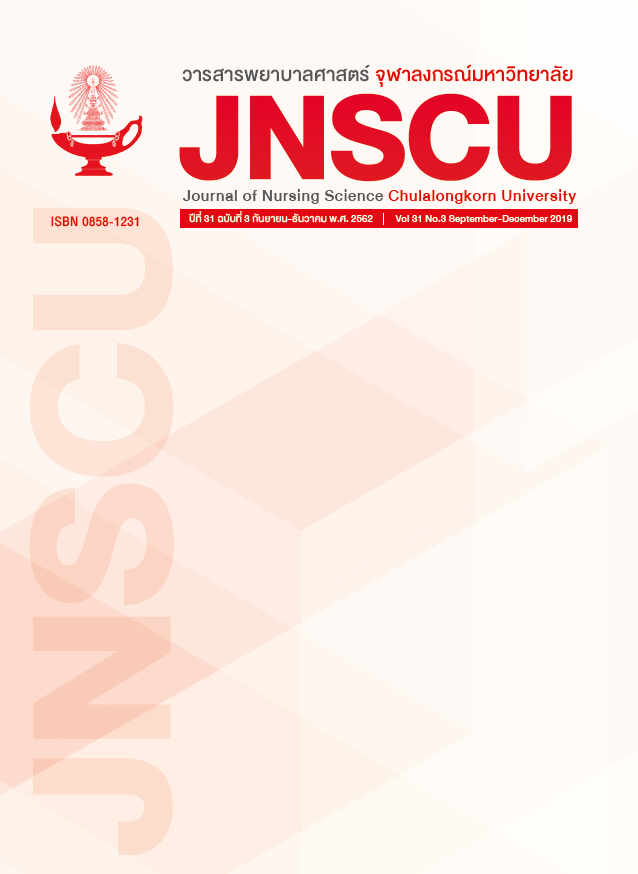ปัจจัยที่มีความสัมพันธ์กับพฤติกรรมการป้องกันการติดเชื้อเอชไอวีของเยาวชนแรงงานข้ามชาติชาวเมียนมา
บทคัดย่อ
วัตถุประสงค์: เพื่อศึกษาปัจจัยที่มีความสัมพันธ์กับพฤติกรรมการป้องกันการติดเชื้อเอชไอวีของเยาวชนแรงงานข้ามชาติชาวเมียนมา
แบบแผนงานวิจัย: การศึกษาวิจัยเชิงพรรณาหาความสัมพันธ์
วิธีดำเนินการวิจัย: กลุ่มตัวอย่างคือ เยาวชนแรงงานข้ามชาติชาวเมียนมาที่เข้ารับการตรวจ ณ โรงพยาบาลสังกัดกรมการแพทย์ เขตกรุงเทพมหานครแห่งหนึ่ง ระหว่างเดือน ตุลาคม ถึง เดือน พฤศจิกายน 2561 จำนวน 120 ราย เก็บข้อมูลโดยใช้แบบสัมภาษณ์ข้อมูลส่วนบุคคล ความรู้เกี่ยวกับเชื้อเอชไอวีและการป้องกันการติดเชื้อเอชไอวี ทัศนคติต่อการป้องกันการติดเชื้อเอชไอวี การรับรู้โอกาสเสี่ยงต่อการติดเชื้อเอชไอวี การรับรู้สมรรถนะของตนในการป้องกันการติดเชื้อเอชไอวี และพฤติกรรมการป้องกันการติดเชื้อเอชไอวี วิเคราะห์โดยใช้สถิติ สัมประสิทธิ์สหสัมพันธ์เพียร์สัน และสัมประสิทธิ์สหสัมพันธ์แบบพอยท์ไบซีเรียล
ผลการวิจัย: พบว่าปัจจัยที่มีความสัมพันธ์ทางบวกกับพฤติกรรมการป้องกันการติดเชื้อเอชไอวีของเยาวชนแรงงานข้ามชาติชาวเมียนมาอย่างมีนัยสำคัญทางสถิติที่ (p < .05) ได้แก่ ความรู้เกี่ยวกับเชื้อเอชไอวีและการป้องกันการติดเชื้อเอชไอวี (r = .44) ทัศนคติต่อการป้องกันการติดเชื้อเอชไอวี (r = .48) การรับรู้ความเสี่ยงต่อการติดเชื้อเอชไอวี (r =.51) และการรับรู้สมรรถนะของตนในการป้องกันการติดเชื้อเอชไอวี (r =.43) ส่วนปัจจัยที่ไม่มีความสัมพันธ์กับได้แก่ เพศ สถานภาพการสมรส และระดับการศึกษา
สรุป: การส่งเสริมให้เกิดพฤติกรรมการป้องกันการติดเชื้อเอชไอวีในเยาวชนแรงงานข้ามชาติชาวเมียนมาควรเน้นส่งเสริมให้ด้านความรู้ ปรับทัศนคติ เพิ่มการรับรู้โอกาสเสี่ยง และเสริมสร้างการรับรู้สมรรถนะของตน เกี่ยวกับเชื้อเอชไอวีและการป้องกันการติดเชื้อเอชไอวีที่เหมาะสม
คำสำคัญ: ปัจจัยที่มีความสัมพันธ์ พฤติกรรมการป้องกันการติดเชื้อเอชไอวี/ เยาวชนแรงงานข้ามชาติ/ ชาวเมียนมา
เผยแพร่แล้ว
ฉบับ
ประเภทบทความ
สัญญาอนุญาต
ลิขสิทธิ์ (c) 2020 วารสารพยาบาลศาสตร์ จุฬาลงกรณ์มหาวิทยาลัย

อนุญาตภายใต้เงื่อนไข Creative Commons Attribution-NonCommercial-NoDerivatives 4.0 International License.
##default.contextSettings.thaijo.licenseTerms##


